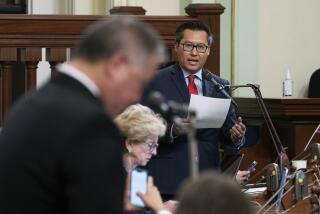Supreme Court quashes another campaign finance law
The Supreme Court, sharply divided along ideological lines, struck down part of an Arizona campaign funding law, ruling that states and cities may not seek to “level the playing field” by giving extra public funds to candidates who agree to abide by spending limits.
The 5-4 decision strikes down a provision in an anti-corruption law adopted by Arizona after a bribery scandal involving state legislators. It offered extra “matching funds” to candidates who opted to accept only public funds but faced free-spending opponents who relied on personal money.
Monday’s ruling follows the Citizens United campaign funding law decision last year, which gave corporations and unions a right to spend freely on election ads. The Arizona outcome came as no surprise.
“Campaign finance laws have now gone 0 for 5 in the Roberts court,” said Richard L. Hasen, an election law expert at the UC Irvine School of Law, referring to the series of campaign finance rules knocked down by the court.
The Arizona decision was the second to say under-funded candidates may not be given extra help to catch up with well-funded rivals. Three years ago, the court voided the so-called millionaire’s amendment in the federal McCain-Feingold Act, which had allowed candidates for Congress to seek big-money contributions if they faced wealthy foes who were spending huge sums of their own money.
In the McCain-Feingold ruling, the 5-4 majority said the effort to “equalize” spending was unconstitutional, leading to the successful challenge to the Arizona law.
But Hasen and others noted the court’s opinion did not reject the idea of public funding for campaigns.
“We do not call into question the wisdom of public financing as a means of funding political candidacy,” Chief Justice John G. Roberts Jr. wrote. He went on to say, however, that states that offer public funding may not give an extra boost to candidates at the expense of their opponents who rely on traditional campaign contributions from private donors.
The court’s decision featured an unusually direct clash between Roberts, speaking for the conservative majority, and Justice Elena Kagan, writing in dissent for the liberals.
They differed over whether the Arizona provision involved a restriction on free speech. Roberts and his colleagues in the majority agreed with two conservative groups who contended the extra public money unfairly infringed on the rights of candidates who rely on private money.
“It is not legitimate for the government to equalize electoral opportunities in this manner,” Roberts wrote. “And such basic intrusion by the government into the heart of the debate over who should govern goes to the heart of 1st Amendment values. Leveling the playing field can sound like a good thing. But in a democracy, campaigning for office is not a game.”
Kagan said the Arizona law put no restriction on freedom of speech. Candidates relying on private money could spend as much as they wished, and say whatever they wished, she said. “By providing more resources to many candidates, [the law] creates more speech and thereby broadens public debate,” she said.
She said the wishes of Arizona’s voters should have been upheld. “Less corruption, more speech. Robust campaigns leading to the election of representatives not beholden to the few, but accountable to the many. The people of Arizona might have expected a decent respect for those objectives,” she wrote. “Today, they do not get it.... Truly, democracy is not a game.”
Roberts had the votes of Justices Antonin Scalia, Anthony M. Kennedy, Clarence Thomas and Samuel A. Alito Jr. Kagan’s dissent was joined by Justices Ruth Bader Ginsburg, Stephen G. Breyer and Sonia Sotomayor. The case was Arizona Free Enterprise Club vs. Bennett.
Maine and North Carolina have adopted similar laws with matching funds, the court noted. Minnesota, Connecticut and Florida also approved such laws, but they have been blocked by courts.
More to Read
Start your day right
Sign up for Essential California for news, features and recommendations from the L.A. Times and beyond in your inbox six days a week.
You may occasionally receive promotional content from the Los Angeles Times.







